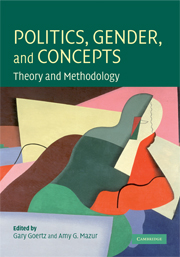Book contents
- Frontmatter
- Contents
- List of figures
- List of tables
- Notes on contributors
- Acknowledgments
- 1 Introduction
- 2 Mapping gender and politics concepts: ten guidelines
- Part I Gendering Concepts
- 3 Gendering democracy
- 4 Gendering representation
- 5 Gendering the welfare state
- 6 Gendering governance
- 7 Gendering development
- Part II Gender-Specific Concepts
- Appendix: A website for additional gender and politics concepts
- References
- Index
6 - Gendering governance
Published online by Cambridge University Press: 06 July 2010
- Frontmatter
- Contents
- List of figures
- List of tables
- Notes on contributors
- Acknowledgments
- 1 Introduction
- 2 Mapping gender and politics concepts: ten guidelines
- Part I Gendering Concepts
- 3 Gendering democracy
- 4 Gendering representation
- 5 Gendering the welfare state
- 6 Gendering governance
- 7 Gendering development
- Part II Gender-Specific Concepts
- Appendix: A website for additional gender and politics concepts
- References
- Index
Summary
Since the late 1980s, governance has become a central concept used not only by political scientists and other social scientists but also by policymakers and politicians located at the local, national, regional, and global levels. Indeed, Peters and Pierre (2000: 1) argue that “one key reason for the importance of this concept is its capacity – unlike that of the narrower term ‘government’ – to cover the whole range of institutions and relationships involved in the process of governing.” However, the broadening out from the study of government to governance has also resulted in an ambiguous, complex, and all-embracing concept that is both useful and problematic. There is no one definition that all practitioners and social scientists agree upon, and, as a result, the concept is used in many different ways. For example, Bevir and Rhodes (2003) list seven different definitions of governance: governance as new public management; governance as international interdependence; governance as a socio-cybernetic system; governance as the new political economy; governance as corporate governance; governance as good governance; and governance as networks.
But although the term “governance” can be applied to almost any institution or organization, this chapter looks at the ways “governance” is used by political scientists both conceptually and within different subdisciplines. In her overview of the governance literature in political science, Kjaer (2004) outlines the varying uses and definitions that are evident in the three different subfields that have been most interested in governance: public administration and public policy; international relations / international political economy (IR/IPE); and comparative politics.
- Type
- Chapter
- Information
- Politics, Gender, and ConceptsTheory and Methodology, pp. 114 - 135Publisher: Cambridge University PressPrint publication year: 2008
- 6
- Cited by

